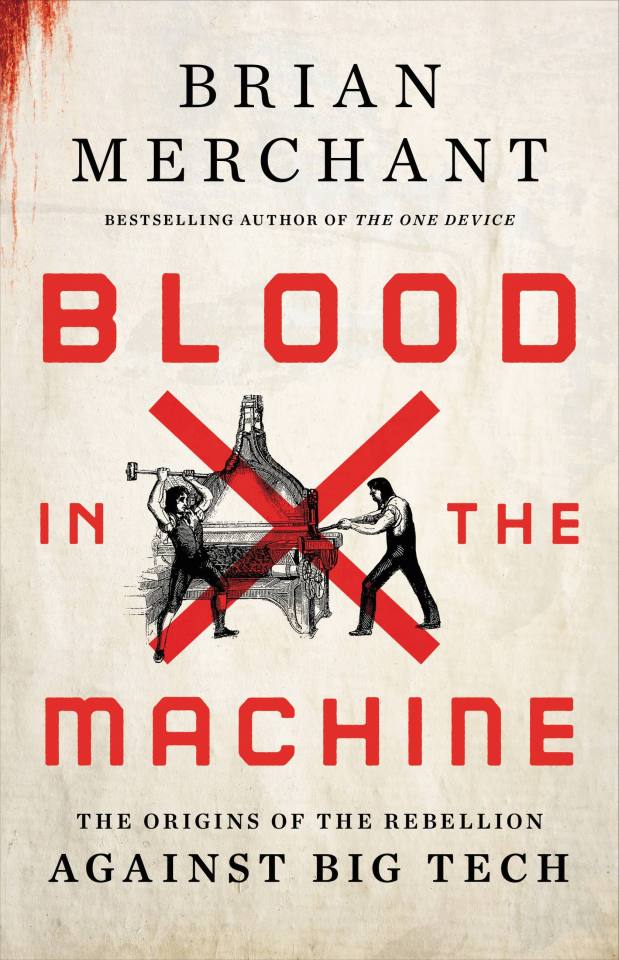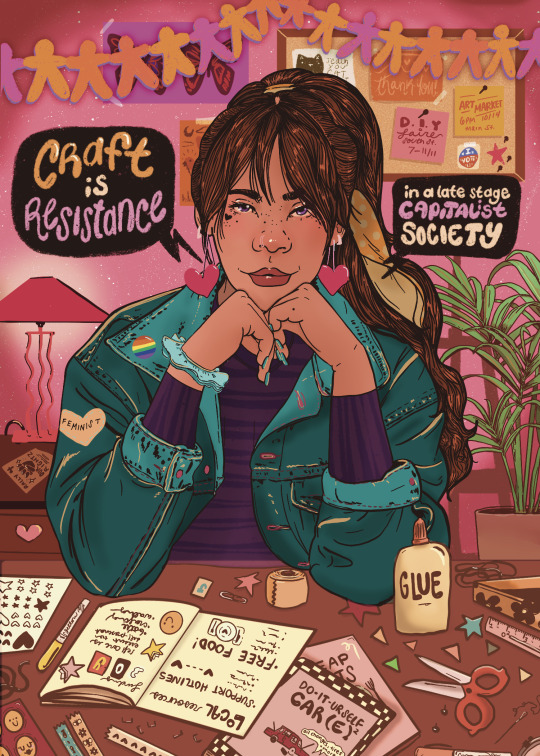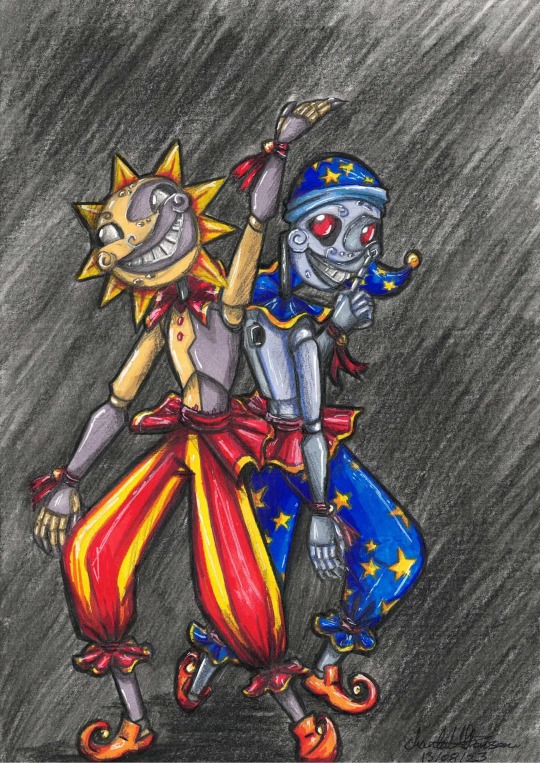#makers
Text
Brian Merchant’s “Blood In the Machine”

Tomorrow (September 27), I'll be at Chevalier's Books in Los Angeles with Brian Merchant for a joint launch for my new book The Internet Con and his new book, Blood in the Machine. On October 2, I'll be in Boise to host an event with VE Schwab.

In Blood In the Machine, Brian Merchant delivers the definitive history of the Luddites, and the clearest analysis of the automator's playbook, where "entrepreneurs'" lawless extraction from workers is called "innovation" and "inevitable":
https://www.littlebrown.com/titles/brian-merchant/blood-in-the-machine/9780316487740/
History is written by the winners, and so you probably think of the Luddites as brainless, terrified, thick-fingered vandals who smashed machines and burned factories because they didn't understand them. Today, "Luddite" is a slur that means "technophobe" – but that's neither fair, nor accurate.
Luddism has been steadily creeping into pro-labor technological criticism, as workers and technology critics reclaim the term and its history, which is a rich and powerful tale of greed versus solidarity, slavery versus freedom.
The true tale of the Luddites starts with workers demanding that the laws be upheld. When factory owners began to buy automation systems for textile production, they did so in violation of laws that required collaboration with existing craft guilds – laws designed to ensure that automation was phased in gradually, with accommodations for displaced workers. These laws also protected the public, with the guilds evaluating the quality of cloth produced on the machine, acting as a proxy for buyers who might otherwise be tricked into buying inferior goods.
Factory owners flouted these laws. Though the machines made cloth that was less durable and of inferior weave, they sold it to consumers as though it were as good as the guild-made textiles. Factory owners made quiet deals with orphanages to send them very young children who were enslaved to work in their factories, where they were routinely maimed and killed by the new machines. Children who balked at the long hours or attempted escape were viciously beaten (the memoir of one former child slave became a bestseller and inspired Oliver Twist).
The craft guilds begged Parliament to act. They sent delegations, wrote petitions, even got Members of Parliament to draft legislation ordering enforcement of existing laws. Instead, Parliament passed laws criminalizing labor organizing.
The stakes were high. Economic malaise and war had driven up the price of life's essentials. Workers displaced by illegal machines faced starvation – as did their children. Communities were shattered. Workers who had apprenticed for years found themselves graduating into a market that had no jobs for them.
This is the context in which the Luddite uprisings began. Secret cells of workers, working with discipline and tight organization, warned factory owners to uphold the law. They sent letters and posted handbills in which they styled themselves as the army of "King Ludd" or "General Ludd" – Ned Ludd being a mythical figure who had fought back against an abusive boss.
When factory owners ignored these warnings, the Luddites smashed their machines, breaking into factories or intercepting machines en route from the blacksmith shops where they'd been created. They won key victories, with many factory owners backing off from automation plans, but the owners were deep-pocketed and determined.
The ruling Tories had no sympathy for the workers and no interest in upholding the law or punishing the factory owners for violating it. Instead, they dispatched troops to the factory towns, escalating the use of force until England's industrial centers were occupied by literal armies of soldiers. Soldiers who balked at turning their guns on Luddites were publicly flogged to death.
I got very interested in the Luddites in late 2021, when it became clear that everything I thought I knew about the Luddites was wrong. The Luddites weren't anti-technology – rather, they were doing the same thing a science fiction writer does: asking not just what a new technology does, but also who it does it for and who it does it to:
https://locusmag.com/2022/01/cory-doctorow-science-fiction-is-a-luddite-literature/
Unsurprisingly, ever since I started publishing on this subject, I've run into people who have no sympathy for the Luddite cause and who slide into my replies to replicate the 19th Century automation debate. One such person accused the Luddites of using "state violence" to suppress progress.
You couldn't ask for a more perfect example of how the history of the Luddites has been forgotten and replaced with a deliberately misleading account. The "state violence" of the Luddite uprising was entirely on one side. Parliament, under the lackadaisical leadership of "Mad King George," imposed the death penalty on the Luddites. It wasn't just machine-breaking that became a capital crime – "oath taking" (swearing loyalty to the Luddites) also carried the death penalties.
As the Luddites fought on against increasingly well-armed factory owners (one owner bought a cannon to use on workers who threatened his machines), they were subjected to spectacular acts of true state violence. Occupying soldiers rounded up Luddites and suspected Luddites and staged public mass executions, hanging them by the dozen, creating scores widows and fatherless children.
The sf writer Steven Brust says that the test to tell whether someone is on the right or the left is simple: ask whether property rights are more important than human rights. If the person says "property rights are human rights," they are on the right.
The state response to the Luddites crisply illustrates this distinction. The Luddites wanted an orderly and lawful transition to automation, one that brought workers along and created shared prosperity and quality goods. The craft guilds took pride in their products, and saw themselves as guardians of their industry. They were accustomed to enjoying a high degree of bargaining power and autonomy, working from small craft workshops in their homes, which allowed them to set their own work pace, eat with their families, and enjoy modest amounts of leisure.
The factory owners' cause wasn't just increased production – it was increased power. They wanted a workforce that would dance to their tune, work longer hours for less pay. They wanted unilateral control over which products they made and what corners they cut in making those products. They wanted to enrich themselves, even if that meant that thousands starved and their factory floors ran red with the blood of dismembered children.
The Luddites destroyed machines. The factory owners killed Luddites, shooting them at the factory gates, or rounding them up for mass executions. Parliament deputized owners to act as extensions of law enforcement, allowing them to drag suspected Luddites to their own private cells for questioning.
The Luddites viewed property rights as just one instrument for achieving human rights – freedom from hunger and cold – and when property rights conflicted with human rights, they didn't hesitate to smash the machines. For them, human rights trumped property rights.
Their bosses – and their bosses' modern defenders – saw the demands to uphold the laws on automation as demands to bring "state violence" to bear on the wholly private matter of how a rich man should organize his business. On the other hand, literal killing – both on the factory floor and at the gallows – was not "state violence" but rather, a defense of the most important of all the human rights: the rights of property owners.
19th century textile factories were the original Big Tech, and the rhetoric of the factory owners echoes down the ages. When tech barons like Peter Thiel say that "freedom is incompatible with democracy," he means that letting people who work for a living vote will eventually lead to limitations on people who own things for a living, like him.
Then, as now, resistance to Big Tech enjoyed widespread support. The Luddites couldn't have organized in their thousands if their neighbors didn't have their backs. Shelley and Byron wrote widely reproduced paeans to worker uprisings (Byron also defended the Luddites in the House of Lords). The Brontes wrote Luddite novels. Mary Shelley's Frankenstein was a Luddite novel, in which the monster was a sensitive, intelligent creature who merely demanded a say in the technology that created him.
The erasure of the true history of the Luddites was a deliberate act. Despite the popular and elite support the Luddites enjoyed, the owners and their allies in Parliament were able to crush the uprising, using mass murder and imprisonment to force workers to accept immiseration.
The entire supply chain of the textile revolution was soaked in blood. Merchant devotes multiple chapters to the lives of African slaves in America who produced the cotton that the machines in England wove into cloth. Then – as now – automation served to obscure the violence latent in production of finished goods.
But, as Merchant writes, the Luddites didn't lose outright. Historians who study the uprisings record that the places where the Luddites fought most fiercely were the places where automation came most slowly and workers enjoyed the longest shared prosperity.
The motto of Magpie Killjoy's seminal Steampunk Magazine was: "Love the machine, hate the factory." The workers of the Luddite uprising were skilled technologists themselves.
They performed highly technical tasks to produce extremely high-quality goods. They served in craft workshops and controlled their own time.
The factory increased production, but at the cost of autonomy. Factories and their progeny, like assembly lines, made it possible to make more goods (even goods that eventually rose the quality of the craft goods they replaced), but at the cost of human autonomy. Taylorism and other efficiency cults ended up scripting the motions of workers down to the fingertips, and workers were and are subject to increasing surveillance and discipline from their bosses if they deviate. Take too many pee breaks at the Amazon warehouse and you will be marked down for "time off-task."
Steampunk is a dream of craft production at factory scale: in steampunk fantasies, the worker is a solitary genius who can produce high-tech finished goods in their own laboratory. Steampunk has no "dark, satanic mills," no blood in the factory. It's no coincidence that steampunk gained popularity at the same time as the maker movement, in which individual workers use form digital communities. Makers networked together to provide advice and support in craft projects that turn out the kind of technologically sophisticated goods that we associate with vast, heavily-capitalized assembly lines.
But workers are losing autonomy, not gaining it. The steampunk dream is of a world where we get the benefits of factory production with the life of a craft producer. The gig economy has delivered its opposite: craft workers – Uber drivers, casualized doctors and dog-walkers – who are as surveilled and controlled as factory workers.
Gig workers are dispatched by apps, their faces closely studied by cameras for unauthorized eye-movements, their pay changed from moment to moment by an algorithm that docks them for any infraction. They are "reverse centaurs": workers fused to machines where the machine provides the intelligence and the human does its bidding:
https://pluralistic.net/2021/02/17/reverse-centaur/#reverse-centaur
Craft workers in home workshops are told that they're their own bosses, but in reality they are constantly monitored by bossware that watches out of their computers' cameras and listens through its mic. They have to pay for the privilege of working for their bosses, and pay to quit. If their children make so much as a peep, they can lose their jobs. They don't work from home – they live at work:
https://pluralistic.net/2021/01/22/paperback-writer/#toothless
Merchant is a master storyteller and a dedicated researcher. The story he weaves in Blood In the Machine is as gripping as any Propublica deep-dive into the miserable working conditions of today's gig economy. Drawing on primary sources and scholarship, Blood is a kind of Nomadland for Luddites.
Today, Merchant is the technology critic for the LA Times. The final chapters of Blood brings the Luddites into the present day, finding parallels in the labor organizing of the Amazon warehouse workers led by Chris Smalls. The liberal reformers who offered patronizing support to the Luddites – but didn't imagine that they could be masters of their own destiny – are echoed in the rhetoric of Andrew Yang.
And of course, the factory owners' rhetoric is easily transposed to the modern tech baron. Then, as now, we're told that all automation is "progress," that regulatory evasion (Uber's unlicensed taxis, Airbnb's unlicensed hotel rooms, Ring's unregulated surveillance, Tesla's unregulated autopilot) is "innovation." Most of all, we're told that every one of these innovations must exist, that there is no way to stop it, because technology is an autonomous force that is independent of human agency. "There is no alternative" – the rallying cry of Margaret Thatcher – has become our inevitablist catechism.
Squeezing the workers' wages conditions and weakening workers' bargaining power isn't "innovation." It's an old, old story, as old as the factory owners who replaced skilled workers with terrified orphans, sending out for more when a child fell into a machine. Then, as now, this was called "job creation."
Then, as now, there was no way to progress as a worker: no matter how skilled and diligent an Uber driver is, they can't buy their medallion and truly become their own boss, getting a say in their working conditions. They certainly can't hope to rise from a blue-collar job on the streets to a white-collar job in the Uber offices.
Then, as now, a worker was hired by the day, not by the year, and might find themselves with no work the next day, depending on the whim of a factory owner or an algorithm.
As Merchant writes: robots aren't coming for your job; bosses are. The dream of a "dark factory," a "fully automated" Tesla production line, is the dream of a boss who doesn't have to answer to workers, who can press a button and manifest their will, without negotiating with mere workers. The point isn't just to reduce the wage-bill for a finished good – it's to reduce the "friction" of having to care about others and take their needs into account.
Luddites are not – and have never been – anti-technology. Rather, they are pro-human, and see production as a means to an end: broadly shared prosperity. The automation project says it's about replacing humans with machines, but over and over again – in machine learning, in "contactless" delivery, in on-demand workforces – the goal is to turn humans into machines.
There is blood in the machine, Merchant tells us, whether its humans being torn apart by a machine, or humans being transformed into machines.
Brian and I are having a joint book-launch tomorrow night (Sept 27) at Chevalier's Books in Los Angeles for my new book The Internet Con and his new book, Blood in the Machine:
https://www.eventbrite.com/e/the-internet-con-by-cory-doctorow-blood-in-the-machine-by-brian-merchant-tickets-696349940417



If you'd like an essay-formatted version of this post to read or share, here's a link to it on pluralistic.net, my surveillance-free, ad-free, tracker-free blog:
https://pluralistic.net/2023/09/26/enochs-hammer/#thats-fronkonsteen
#pluralistic#books#reviews#brian merchant#luddism#automation#history#gift guide#steampunk#makers#tina#inevitablism#reverse centaurs#amazon#arise
546 notes
·
View notes
Text
Hey Makers.
I wanna know, What's on your bench today?
Us:

#makers#share#what are you creating#show us#builds#crafting#painting#drawing#stitching#leatherwork#anything
184 notes
·
View notes
Text










Happy Makers Monday everyone!
As I continue to work on the surge of orders that came through at the end of 2022, I just wanted to share a couple photos of some of the items that left the workshop last week. :)
Thank you to all who visit the shop, and for your patience. I'm really excited to see what this new year has to hold. ^^
Wishing you all a wonderful week. Stay safe out there. ❤️
Shop @ https://www.etsy.com/shop/ArcherInventive
#makers monday#makers#handmade#bracers#pouches#adventure gear#medieval#viking#fantasy fashion#sparkle#mushrooms#daggers#archer inventive
731 notes
·
View notes
Photo

Craft is resistance in a late stage capitalist society!
{digital illustration of a woman with long brown hair wearing a jean jacket and purple sweater. She’s sitting at a craft table with zine making supplies. Text reads, ‘craft is resistance in a late stage capitalist society.’}
#art#feminism#craftivism#craft#activism#diy#diy punk#diy feminist#zines#feminist zine#feminist art#resistance#productivity#capitalism#anti capitalism#makers#crafting
763 notes
·
View notes
Text


FNAF Security Breach Ruin DLC came out recently and while I wasn't overly impressed with the botched up mess they made of the first one's game & story, the DLC was a decent improvement. Nice to see they took on board a lot of the feedback from the first one.
Naturally, I had to draw my two favourite boys and I wanted to make my own unwithered Eclipse, so here's that too :)
#fnaf#fnaf sb#fnaf moon#fnaf sun#daycare attendent#traditional art#my art#makers#fnaf eclipse#sundrop#moondrop#why do these two have so many different names > <
121 notes
·
View notes
Text
“Soon the knitter herself will visualize a thousand of other ways in which a motif can be used, and so fave at her disposal an exhaustible variety of fabrics. Thick fabrics or thin fabrics, patterned fabrics or plain fabrics, those blazing in colour or decorated with beads, she can make fabric imitated fur (Looped Knitting), Lace, Picot, Filet, or Crochet, and even cloque and woven fabric, by a mere change of technique. Every ornament known to dressmaking can be imitated, even hemstitching and buttons!”
When Mary Thomas wrote this in 1945 in Mary Thomas’s Book of Knitting Patterns when dressmaking was the most common craft women learned. Circular knitting, which she called seamless knitting, was viewed as peasant knitting, interesting historically, but not something most women likely to do. So, comparing knitting to dressmaking was a compliment. In fact, sewing pieces of knitted fabric was taken for granted and Thomas offered the same garment block or garment schematic that we see in dressmaking in the section explaining how to plan an entirely original sweater.
Similarly, Thomas urged her the reader to imagine new ways of patterning a knitted fabric through her choice of stitches. Every section of the book suggests how variations might be introduced to the stitches she explains. She valued the experimentation and imagination which created the stitches she taught and clearly saw yet more to be invented.
You can find this and other Thomas books at Dover Publications: https://store.doverpublications.com/0486228185.html
#knittingbooks#knitting#knittinginstruction#marythomas#making#makers#dresshistory#costumehistory#fashionhistory#dressmaking#vintageknitting#vintagefashion#vintagedressmaking
141 notes
·
View notes
Note
Imagine a maker knowing your exact ring size by just holding your hand for a moment
ohuhuhhooouuh a maker so so so gently asking to take your hand, and the fact they even need to ask even though you've been together for this long is both funny and makes your chest ache. Their callouses tickle the skin on your palm as they dip their thumb into the cup of it, so large that it covers everything from the heel to the first knuckles. So careful that you have to remind them you're not made of glass.
Fingers as thick as your bicep drag tenderly up the back of your hand, and though your whole appendage feels as though it's being swallowed by theirs, you note that there's a particular pressure being applied to the fourth finger on your left hand.
83 notes
·
View notes
Text
Etsy is using Payment Reserves to stiff their handmade sellers - refusing to pay most of what they're owed until after they create and ship their orders.
Our petition is online, please sign and share!
Etsy: Pay your makers NOW!
In the example (an actual order from a seller on reserve), the buyer paid $33.87, but the seller only received $2.72. It didn't even cover shipping costs.
#etsy reserves#etsy reserve strike#etsy#makers#small business#workers rights#Unions#Strikes#indie sellers
109 notes
·
View notes
Text
- ̗̀᥀💐♡⋮ — Lieutenant Cat ; LAS ALMAS ¦ Call of Duty MWII

— I think I got sidetracked and didn't upload a lot of Cat content lately XD Hope you like it! ✨
°๑✧────ೋु✧❪ 🌸 ❫✧ೋ────✧๑°
#artists on tumblr#drawing#call of duty#cod modern warfare#mw2#call of duty oc#cod mw2#cod oc#call of duty mw2#lieutenant cat#cat call of duty oc#oc: cat#lieutenant cat oc#call of duty: cat oc#call of duty: modern warfare ii#call of duty: warzone#las almas#artist#artwork#traditional art#traditional illustration#traditional drawing#sketchbook#makers#video games#cat cod
37 notes
·
View notes
Text
randoms


#jade the jellyfish#kinito fanart#kinito my beloved#kinitopet#fanart#sam the sea anemone#kinito the axolotl#artists on tumblr#makers#ibispaintx
50 notes
·
View notes
Text
Repostober day 22!

Aaand another pokemon post since I'm here lol
#art#drawing#illustration#art art art#fan art#traditional art#pencil and paper#marker art#marker#makers#ink drawings#pencil and ink#ink art#pokemon#pokemon fanart#buzzwole#he's my favorite its just such a goofy design XD
64 notes
·
View notes
Text
So... What projects are you working on today?

#what projects are you working on?#projects#creativity#cat cosplay#cosplay#cats#kitty#cats in costumes#cat#fan art#cat costume#aww#cats of tumblr#bob ross#makers
399 notes
·
View notes
Text




🎊🎉The color coordination is good and I liked it 💍💍
#handicraft#handmade#craft#crafts#makers#making#diy#doityourself#handmadewithlove#supportsmallbusiness#handembroidery#embroideryart#embroiderylove#embroiderydesign#embroideryhoop#embroiderypattern#embroideryflowers#handembroidered#embroiderylife#modernembroidery#freehandembroidery#cold#coldplay#cold chamber#cold war#cold weather#winter#snow#ice#branches
50 notes
·
View notes
Text


2024 Crochet Mood Blanket! Weeks 9 & 10! Last week we were around family. This week I'm trying to stay calm. I'm getting married in a month, so gotta destress myself. 💗🩵
Mood blanket: 1 row a week for the full year. The colors are based on my general mood for that week! I’ll have this pattern completed at the end of the year!
Link to my blog/website: https://crochetml.com/
Check out the tiktok here!
#yarn#fiberartist#crocheters#crochet#crocheting#crocheted#crochetersofinstagram#fyptiktok#makers#crochetblanket#crochetcreations#instacrochet#moodblanket#crochetallthethings#crochet365#crochetdesigner#crochetaddict#moodboard#crochetinspiration#crochetinstagram#crochetafghan#crochetblankets#love#craftastherapy#diy#mood#creative#craft#handmade#beautiful
20 notes
·
View notes
Text


• I'm not everyone's cup of tea but I'm someone's whiskey double •
274 notes
·
View notes
Text
When you embroider, crochet, or knit, there are centuries in your hands. You are a maker, doing the same thing others have done for several thousand years. Their ideas created the techniques you now use. Who knows what pair of hands first cabled some stitches across some other stitches? Who knows where and when the first yarn over stitch was put on a needle to make an opening? All that matters is that they were done, somewhere, by someone. Now they are a part of the very ancient craft called knitting. This craft has endured, for the same reason that all such crafts endure: because people have loved it.
This passage by Barbara G Walker, one of the grandes dames of knitting, strikes me as both appreciative of history and dismissive of history at the same time. On the one hand, she is celebrating the long traditions which created, modified, and handed down so many marvelous methods of knitting. On the other hand, she does not give a hoot who exactly did what first. And yes, there are out there scholars, curators, and other such people who are keenly determined to hunt down first instances.
I would like to add to the quotation, "When you sew...." I see the wealth of dressmaking know-how in the many vintage books and vintage patterns I have and I marvel at the cleverness and creativity on display.
So, a toast to all makers, everywhere, in every era, and thanks.
This is from Walker's 1970 volume, A Second Treasury of Knitting Patterns, a stupendous collection of a large variety of knitting stitch patterns, and one of her many books.
#barbaragwalker#knitting#knittingbook#knittingstitchbook#asecondtreasuryofknittingpatterns#making#makers#historyofknitting#knittinghistory#historyofmaking#vintageneedlecraft#vintagesewing#sewing#dressmaking
138 notes
·
View notes